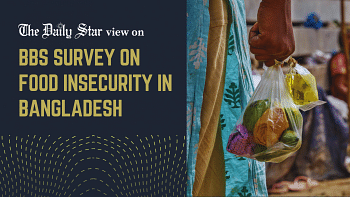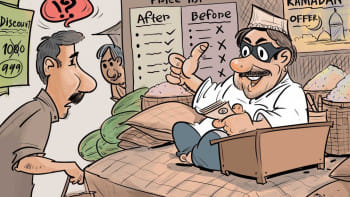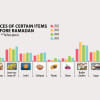Twelve Good Samaritans exemplify the spirit of Ramadan

With food prices reaching unbearable heights during the Ramadan, it is heartwarming to learn of endeavours by ordinary citizens to help those who cannot afford even basic food items for iftar. A recent multimedia report by this paper tells the story of 12 friends who have been providing iftar at Tk 1 per item, whatever it may be. The iftar is sold from Iqbal Hotel in Daulatpur, Khulna, a small diner owned by one of the friends who started this effort around 18 years ago. Eleven others, who have their own jobs or small businesses, later joined hands with him. Their goal is to provide iftar for the underprivileged at the lowest possible price, and this is what they are doing.
Since before the start of the holy month, we have regularly commented on how the prices of daily essentials and ingredients required for traditional iftar items have soared drastically, making it difficult for the lower-income groups to afford items to break their fasts with.
What is most interesting and inspiring about the above story is that this group of Good Samaritans includes individuals of other faiths as well, giving an example of tolerance and harmony among people from diverse communities. Giving whatever time they can spare after work, and pooling their own funds, they seem to find great pleasure in working for those in need. There have been reports of other individuals in various parts of the country who have been taking such laudable initiatives.
While the government has the primary obligation to keep food prices affordable for the general people, society as a whole has a responsibility to take care of its own. Altruism within the community is essential during times of crises, and we have seen its manifestation the most during the Covid pandemic. In those difficult days, it was the charitable donations and gestures—whether in cash or kind—that helped thousands of people to stay afloat. Even now, many charitable organisations and individuals quietly work to help the poor in whatever way they can.
For the twelve men from Daulatpur, serving humanity is their goal. The society and government should acknowledge such noble examples to inspire others. A society where members take care of each other in times of need is one that is resilient and destined to flourish in every way.


 For all latest news, follow The Daily Star's Google News channel.
For all latest news, follow The Daily Star's Google News channel. 











Comments